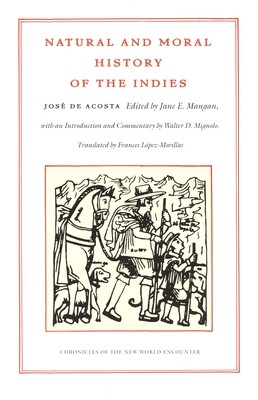
- We will send in 10–14 business days.
- Author: José de Acosta
- Publisher: Duke University Press
- ISBN-10: 0822328453
- ISBN-13: 9780822328452
- Format: 15.2 x 22.9 x 3.8 cm, softcover
- Language: English
- SAVE -10% with code: EXTRA
Reviews
Description
The Natural and Moral History of the Indies, the classic work of New World history originally published by José de Acosta in 1590, is now available in the first new English translation to appear in several hundred years. A Spanish Jesuit, Acosta produced this account by drawing on his own observations as a missionary in Peru and Mexico, as well as from the writings of other missionaries, naturalists, and soldiers who explored the region during the sixteenth century. One of the first comprehensive investigations of the New World, Acosta's study is strikingly broad in scope. He describes the region's natural resources, flora and fauna, and terrain. He also writes in detail about the Amerindians and their religious and political practices.
A significant contribution to Renaissance Europe's thinking about the New World, Acosta's Natural and Moral History of the Indies reveals an effort to incorporate new information into a Christian, Renaissance worldview. He attempted to confirm for his European readers that a "new" continent did indeed exist and that human beings could and did live in equatorial climates. A keen observer and prescient thinker, Acosta hypothesized that Latin America's indigenous peoples migrated to the region from Asia, an idea put forth more than a century before Europeans learned of the Bering Strait. Acosta's work established a hierarchical classification of Amerindian peoples and thus contributed to what today is understood as the colonial difference in Renaissance European thinking.
EXTRA 10 % discount with code: EXTRA
The promotion ends in 18d.05:47:18
The discount code is valid when purchasing from 10 €. Discounts do not stack.
- Author: José de Acosta
- Publisher: Duke University Press
- ISBN-10: 0822328453
- ISBN-13: 9780822328452
- Format: 15.2 x 22.9 x 3.8 cm, softcover
- Language: English English
The Natural and Moral History of the Indies, the classic work of New World history originally published by José de Acosta in 1590, is now available in the first new English translation to appear in several hundred years. A Spanish Jesuit, Acosta produced this account by drawing on his own observations as a missionary in Peru and Mexico, as well as from the writings of other missionaries, naturalists, and soldiers who explored the region during the sixteenth century. One of the first comprehensive investigations of the New World, Acosta's study is strikingly broad in scope. He describes the region's natural resources, flora and fauna, and terrain. He also writes in detail about the Amerindians and their religious and political practices.
A significant contribution to Renaissance Europe's thinking about the New World, Acosta's Natural and Moral History of the Indies reveals an effort to incorporate new information into a Christian, Renaissance worldview. He attempted to confirm for his European readers that a "new" continent did indeed exist and that human beings could and did live in equatorial climates. A keen observer and prescient thinker, Acosta hypothesized that Latin America's indigenous peoples migrated to the region from Asia, an idea put forth more than a century before Europeans learned of the Bering Strait. Acosta's work established a hierarchical classification of Amerindian peoples and thus contributed to what today is understood as the colonial difference in Renaissance European thinking.


Reviews